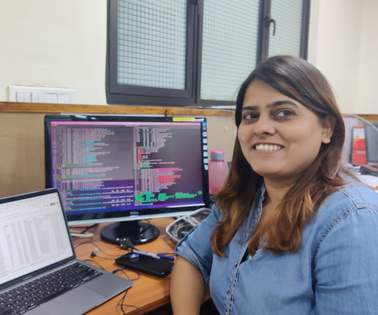November 28, 2022
Meet the IAVI scientist applying her skills to decipher how local HIV circulating strains are evolving within India and how this landscape affects applicability of prevention products for and by LMICs
Jyoti Sutar, Ph.D., senior research associate, Antibody Translational Research Program (previously the HIV Vaccine Translational Research Laboratory)

What is the focus of your work most recently?
I work on viral genomics and evolution. My work thus far has been focused on understanding the viral diversity of HIV circulating in India. Most recently, we have been trying to decipher how the local HIV circulating strains are evolving within the epidemic and how that mutational landscape affects applicability of broadly neutralizing antibodies as prevention products. Our research group led by Dr. Jayanta Bhattacharya is also the first from a low- and middle-income country (LMIC) to report potent monoclonal neutralizing antibodies against SARS-CoV-2. I have been assisting in these efforts specifically, with analysis of antibody genes.
Why is your work unique/important within the global health research and development landscape?
India is a uniquely diverse country in terms of genetic, environmental, and demographic factors that affect behavioural as well as nutritional habits and diets. In absolute terms, we have one of the largest populations of people living with HIV (PLWH) globally and a significant proportion belong to low-income groups with limited access to medical services and thus elevated risk of acquiring comorbidities. The HIV epidemic in India is therefore quite heterogenous with different risk groups and transmission clusters driving the epidemic uniquely in different pockets of the country. Furthermore, our work has demonstrated that HIV-1 subtype C circulating in India is genetically diverse from that circulating in other global regions and therefore requires special consideration when designing any prevention and therapeutic modalities.
What is the one thing you would want people to walk away remembering about your research?
Viral evolution remains fascinating to us researchers, yet despite global efforts, it is meagrely understood. It can have devastating impact on affected populations as is evident from the COVID-19 pandemic and the many waves with different variants of concern (VOC) of SARS-CoV-2. Now imagine having new VOCs in the same person every time a dose of medication is missed. That’s what millions of PLWH experience and battle with throughout their lives when they have limited access to adequate medical services. This also causes the HIV epidemic to grow and the virus to diversify and evolve further. Long-acting effective prevention and therapeutic modalities accessible to all affected PLWH are therefore most urgent. Our research suggests that globally and locally, HIV strains may be steadily becoming less sensitive to the present clinically important prevention products being developed and therefore, I believe it is equally important to continually monitor so that these prevention products keep up with evolving viral strains. Ensuring this will be crucial to achieving the UNAIDS goal of making the HIV pandemic a low-level endemic disease by 2030.
Who has been an important influence in your work?
It is difficult to identify one person or a moment that has been most influential. Early on in my research career, I got opportunities to interact with many PLWH. This included people my age, the elderly and most notably, many children who were born with HIV. Witnessing their struggles and their resolve to lead a normal life has deeply impacted my approach to life and the field of research I would like to pursue. I am fortunate to have been working with intelligent, hard-working, and supportive colleagues as well as mentors like Dr. Jayanta Bhattacharya and Dr. Vainav Patel. I will be most grateful and satisfied if my research makes a positive impact or advancement in making an effective HIV vaccine or a successful therapeutic product.
What is one thing people would be surprised to know about you?
That I have apparently incongruent interests! I like building and fixing things using a good old toolbox with hammers, drills, etc., but am definitely not an outdoors person. Also, I am the designated expert/rescuer in all computer/phone/gadget affairs for my near and dear ones. I have also picked up crocheting as a hobby over the last year and have found it to be the most productive and fun stress buster ever. I hope to design and crochet a complete outfit some day!